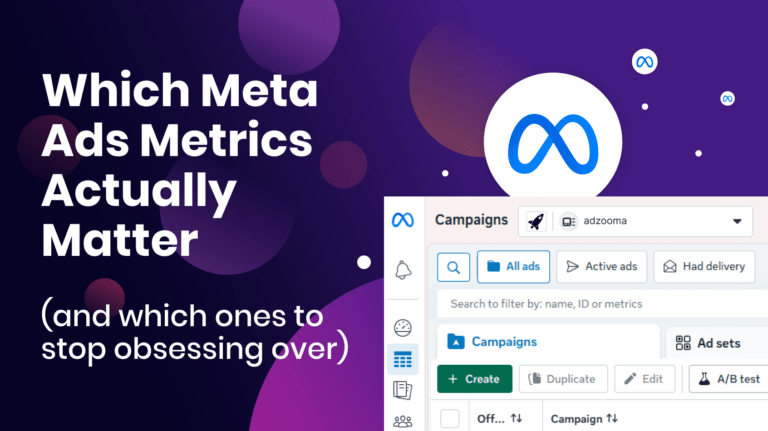PPC keyword research is an essential part of a PPC campaign. Our guide will show you how our experienced team at Adzooma have created a bulletproof keyword research strategy for you to take away and use.
With anything you do in business, it’s important to have an action plan and know how to get there. Pay-per-click advertising (PPC) can help you reach those goals but you need to know what keywords to target in your ads. Keywords are the foundation for everything in PPC. But without effective and comprehensive research, you could be building your campaigns on sinking sand instead of solid stone.
What are PPC keywords?
Keywords are words or phrases that users search for on search engines like Google or Bing. When creating paid ads, you aim to target keywords so when people search for them, your ads appear at the top of the page. There are different types of keywords that you can have, and all can provide influence over how effective your PPC campaign is.
There are keyword types like:
- Branded keywords that include company names
- Generic keywords that cover ambiguous terms
- Transactional keywords that cover both strong and weak purchase intent
- Locational keywords that cover a location and are great for those location-based companies
- Informational keywords that cover people who are simply looking for information
You also have service/product-specific keywords and keywords with high intent (related to discounts or special days).
When you’re creating ad groups (which we’ll touch on later), it’s important to consider these keywords types and how you want to group them together.
Why is PPC keyword research so important?
PPC campaigns are more powerful with effective keyword research and the importance of research shouldn’t be overlooked. Here are 3 reasons why you should make it a priority:
1. It helps you to budget and forecast your cost-per-click (CPC)
Keyword research can help you figure out the right budget for your PPC campaign by letting you plan ahead with what you can and can’t spend and ways of working around it with alternative keywords. That prevents overspend and miscalculation, saving money in the long run.
2. It helps you to achieve campaign goals
As I said earlier, PPC campaigns should have goals that you want to achieve and keyword research can help you achieve them. It’s all about organisation and strategy.
3. Increasing ROI (Return On Investment)
And of course, return on investment, as every ad contributes to it and ultimately keyword research boosts your chances of achieving the best ROI
How to conduct your research
There’s more than one way to do keyword research, but I want to take you through the approach we take at Adzooma, a practice which has been honed on a daily basis since our inception in 2015.
Our PPC team at Adzooma is an experienced one. Altogether, we have over 30 years worth of experience in PPC ads, while pretty much everyone at Adzooma has some kind of PPC knowledge (being a PPC platform and all!). So we know the importance of keyword research in the pursuit of true PPC success.
Know yourself
Before starting on the process of finding the right keyword, to begin you need to look at yourself and ask the question, “What do I want from this campaign?”.
- Do you want more people to know about your brand?
- Do you want to take clients away from your competitor?
- Do you just simply want to sell more stuff?
Write down your answers and critically assess them. Think about what you want to achieve and why. Think about what’s important to your business right now, what your main goal is, what you want more than anything. These are business-level goals, but to make your PPC strategy successful, those business-level goals need to be attended to and worked upon. Ultimately, you need to make sure you’re not working in a silo.
From there, worm your way down. Think about your audience, your content strategy and revise (or create) your customer personas. If these are three things you’ve done recently then great. If not, this is a vital step you can’t overlook, but one that will take time.
Therefore, familiarise yourself with this article we did with the University of Cambridge on Content Strategy, it’ll help you with the strategy behind the keyword. Because to get keyword research right, you need to know who you want to target and how you want to target them.
Research, research, research
Once you’ve taken the time out to get to know yourself and what you want, then it’s time to move on to something that seems a little more tangible, and that’s getting those keywords out from your mind and onto paper.
Trying to think of every keyword you want for each campaign for each task is a tough task, so to begin, jot down a few categories which you can put each keyword into. Here are some examples for a made up travel company called Tomsa:
- Branded keywords – Keywords that are specific to you and your business/brand (e.g. Tomsa, Tomsa holidays, Tomsa fly drives)
- Service / product specific keywords – Keywords that are related to what you’re offering (e.g. Holidays to the Caribbean, Route 66 Fly Drives, Brazil holidays)
- Feature specific keywords – Keywords that focus on a particular offer, deal on aspect of your service / product (e.g. Cheap USA holidays, best travel deals, low deposit cruise holidays)
- High intent keywords – The kind of keywords where users are further down the funnel and ready to buy (e.g. Book flights to Los Angeles, buy Norweigan cruise holiday, rent car in Barcelona)
- Related keywords – Keywords that further up the funnel that don’t directly point to your business (e.g. sights in Rome, theme parks in Florida, best ballparks in America)
Then begin thinking of keywords you can put into each category. Loads may flood to mind straight away and if they do, great, jot them all down, but if they don’t. There are plenty of great ways to inspire some inspiration.
Once upon a time, you needed to use 5 tools to conduct your keyword research, but these days, so much of it can just be done via Google with their vast array of ever-increasing features and browser extensions.
Just look at their auto completion feature, it’s a goldmine for PPCers. This what I get when I just type in Los Angeles:
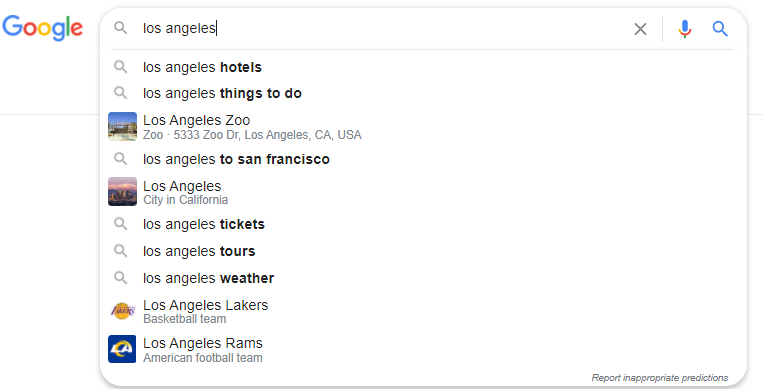
Sure, not everything there is super relatable, but some of it is, and they’re just two words with no context. Look what happens when I type in Los Angeles holiday:
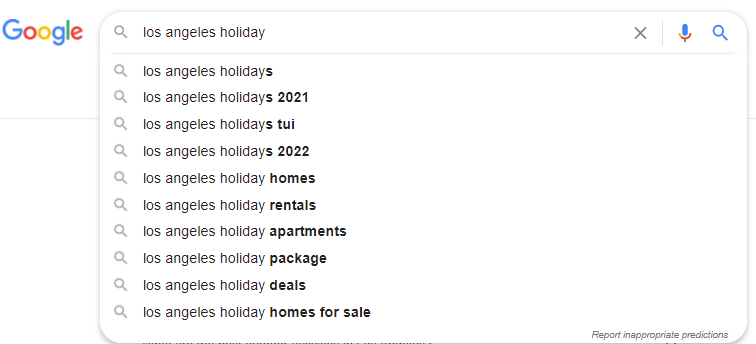
Gold. You can do this by trying different variants for hours and you’d still be coming up with great stuff. You don’t have to just take these ideas too, have a look at what Google comes back with and then have a think of what variants you can come up with from there.
Then take a look at what your competitors are doing too. You might get some really interesting insights, especially for your feature specific keywords.
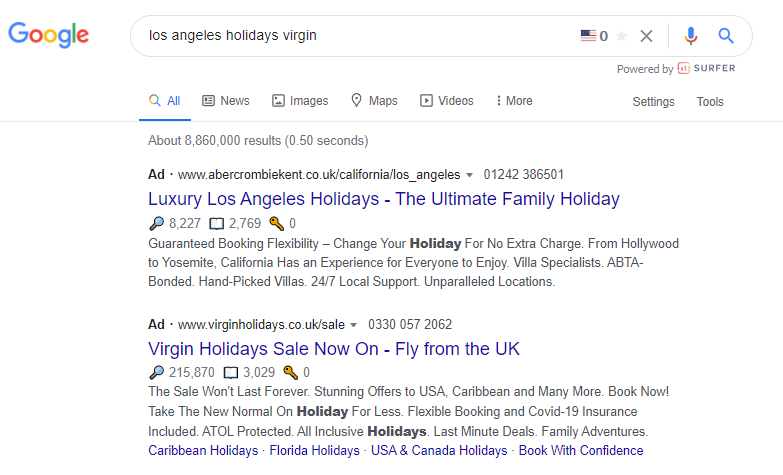
Like here, where Virgin are promoting their ATOL Protection and Ambecrombie & Kent are promoting their booking flexibility. Not only can this kind of research help what kind of keywords you go for, but it can also help inspire the ad copy for your PPC ads and even help shape your business’ offering too.
If you’re struggling for service/product specific keywords, go a bit more granular and search for the whole of your competitor’s site with a generic keyword like so (of course these are organic results, but they’re no less relatable):

Then utilise aforementioned Chrome extensions too like the free Keyword Surfer. Every time you do a search on Google when you have this extension activated it’ll give you a list of keyword ideas related to the one you searched for with a similarity percentage and keyword volume like so:
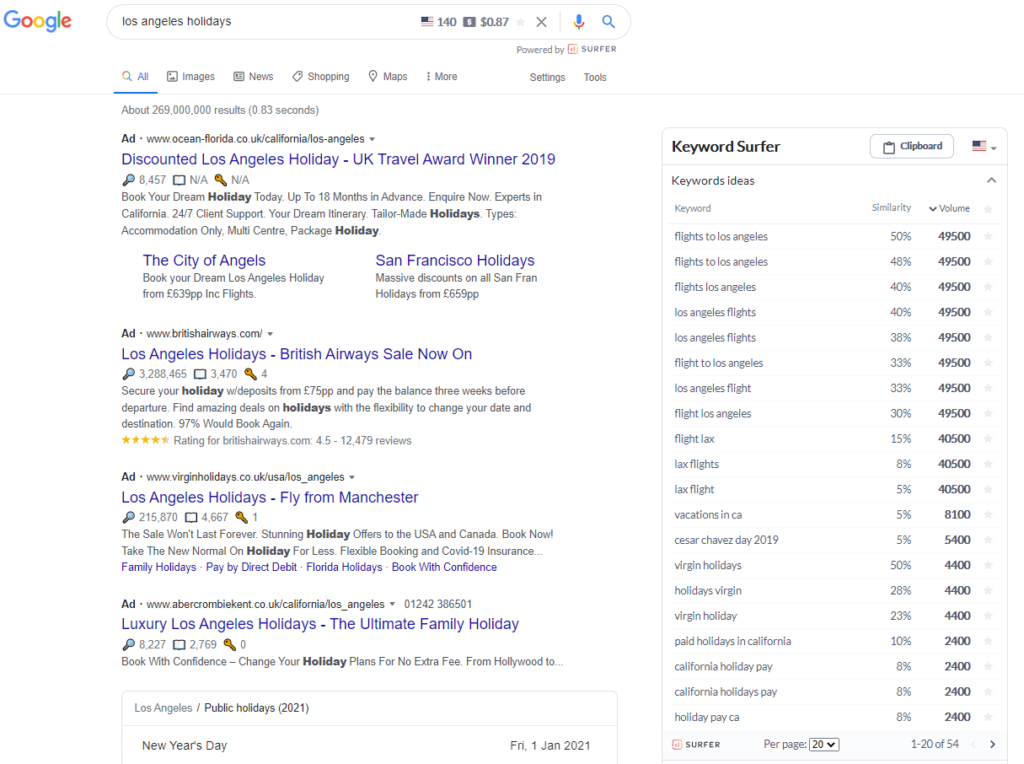
It also tells you in the search box the estimated Google Ads price for this keyword and the search volume too, and this is super important when you’re doing keyword research. It’s alright having loads of ideas jotted down related to your business, but if no one’s searching for those keywords, you’re not going to get any clicks or conversions.
Sorting Your Keywords
So that brings us on to the next part of the task. Sorting and ranking your proposed keywords.
The easiest way to start off is by chucking all your keyword ideas into Google’s Keyword Planner (you need an account to use it – here’s how you can sign up if you haven’t already). The reason for doing this first is because the Keyword Planner will show you the potential keywords’ cost and search volume.
Then, export the data into a CVS format and import it into a Google Sheet. Here you’ll have all your hard work along with Google’s hard work, and you can then start making those all important decisions of which ones you want to go forward with.
What we at Adzooma do from there is create additional columns for Category, Intent, Priority and Relevancy.
This should give you everything you need. If this is your first Google Ads campaign, take it easy on the keywords so it’s easy to monitor and choose the ones that look like they’re going to work out best for you and your business. You can always add more at a later date.
Optimising and Refining
Once your campaigns are up, there’s no setting and forgetting. Whether you’re a veteran or a beginner, you always have to be on top of your campaigns. Even if your keywords look like they’re doing well, there’s always room for improvement with Google Ads.
Refining, optimising and adding new keywords is a continuous process, but once your first keywords and campaigns are up fortunately you don’t have to go through the whole research process again with tools like Adzooma.
Once you’ve connected your Google or Microsoft ad accounts to the Adzooma platform for free, using the Opportunities feature the tool automatically takes a look at your performance over the last 30 days to identify new keywords that will lead to an increase in clicks and conversions.
This is how it works:
- Using the last 30 days of data, Adzoomas identifies keywords that have the best clickthrough rate (CTR) in an Ad Group
- It generates a list of similar keywords
- It estimates the number of clicks these similar keywords will get
- The top ten keywords get suggested
This makes the whole process super easy and gives you so much time back in your working week.
Also in the Opportunities tab, you’ll see other actions you can take in the Improve Performance section that will help with ongoing keyword performance, like the example below:
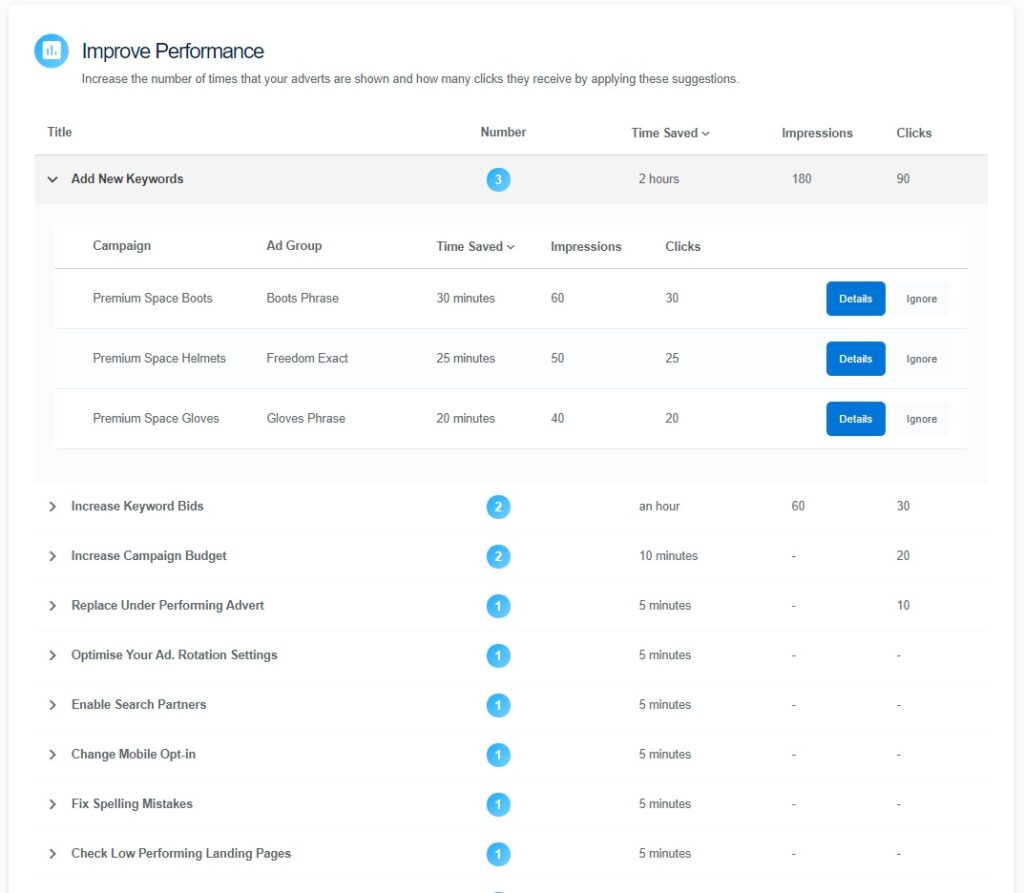
Once you’ve clicked details you’ll see a little bit more info.
These keyword Opportunities are generated based on previous performance data which is analysed by our platform. From that analysis, it provides you an estimated impression and click uplift that you’d receive should you take the actions.
To add them to your campaign, you just need to click Add To Queue which saves you a whole chunk of time and effort in the research stage – approximately 2 hours according to our platform!
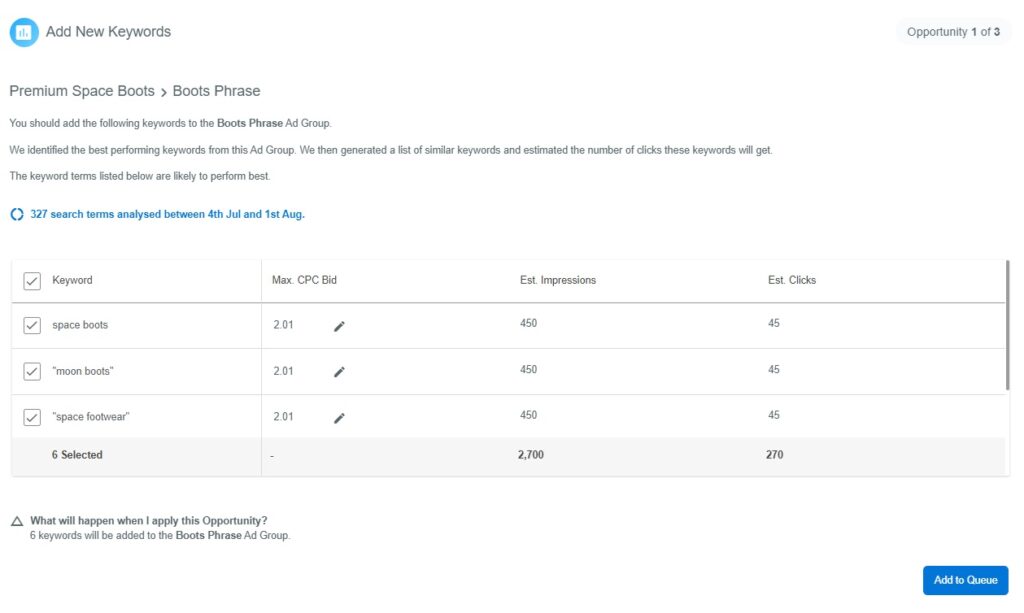
Not signed up to Adzooma yet?
With a full automation suite, 24/7 account monitoring, one-click improvements, intelligent reporting, and so much more, Adzooma is the smarter and easier way to manage your Google, Microsoft and Facebook ads.
Best of all? It’s completely free!
Google Ads search term report controversy
With Google’s recent change to its Google Ads search report, it’s now even more important to get your PPC keyword research right. In September 2020, Google Ads updated its search terms report to only display terms that were searched by a “significant number of users”. The decision has left many PPC marketers upset at the potential effect to their budgets.
A case study by Bethany Bey showed a reduction in the number of ad clicks in the report, from 95% in August to 33% in September. In terms of cost visibility, In August, she could see 93% of search ad spend but in September, it fell to 37%.
That means almost two-thirds of our current budget is being spent on search terms we can’t see, can’t evaluate, and can’t exclude from our campaigns without a lot of work.
Negative keywords
Negative keywords are something many advertisers aren’t using for their PPC campaigns but they should. They prevent your ads from being triggered if a user searches for those terms. They ensure your ads are only shown to people who are likely to click and convert and saves your budget.
A good way of making a negative keyword list is to look at your main keywords and anything that isn’t relevant or appears on there, note it as a negative. The more you add, the more wasted clicks you could be saving.
Here’s our in-depth guide to negative keywords for you to cast your eye over.
Negative Keywords are now part of Adzooma!
Have a read of our guide on how to add or edit negative keywords in your Google and Microsoft campaigns on our free, easy to use PPC management platform.
PPC keyword tools
Away from Google’s Keyword Planner, there are some other fantastic keyword research tools to take advantage of, with lots of capabilities outside the confines of PPC.
If you want to know about tools specific to Google Ads, you should read our article on the best Google Ads tools.
Semrush
Semrush hosts one of the best tools suites in digital marketing and offers a great keyword tool for PPC marketers. Its PPC keyword tool can find missing keywords that your competitors are bidding on, search its database for relevant keywords and manage them into groups, and you can create your own charts for further analysis.
Mangools
Mangools Keyword Finder is a great tool to find long tail keywords with low SEO difficulty. It allows you to find keywords that you can easily rank for, see what your competitors rank for and get search volumes with historical data.
How keyword research can help PPC and SEO
The main difference between PPC keywords and SEO keywords is the former is paid and the latter is free. But while the intentions and methods may be different, the research is effectively the same. At the end of the day, you’re aiming to get a good keyword list and entice users to your site with them.
It’s important for both that you are starting off with a list of starting terms (shorter tail in SEO, more specific in PPC since you’re paying for them and generic keywords eat up your budget). that you’re then expanding this list using keyword research tools, and then refining it with competitive research. This is a process that can be used when it comes to both PPC and SEO.
The more effort you can make on keyword research, the better your SEO will become when it comes to your website and helping your website and pages rank better.
SKAGs (single keyword ad groups) or STAGs (single theme ad groups)?
SKAGs (single keyword ad groups) are ad groups with one keyword in them. On the surface, that sounds counterproductive.
Why would you have an ad group with just one keyword in it?
The advantage of SKAGs used to be more control, higher performance, and a better Quality Score. They also made sure keywords in every ad matched the queries that triggered them and avoided the errors that came about from Dynamic Keyword Insertion (which has since been mitigated by Responsive Search Ads).
But the power of SKAGs has waned and they aren’t generally as effective as they used to be. A 2017 change in how match types work essentially killed off their effectiveness, paving the way for a new type of ad group: single theme ad groups, or STAGs.
STAGs (single theme ad groups) allow you to have multiple keywords in ad groups that are chosen around certain themes. These are easier to maintain because the keywords are grouped together and result in fewer, but more effective ads.
With SKAGs, you had more ad groups to monitor. But with STAGs, you keep the themes of your keywords close together and that can improve click-through rates (CTRs) for your PPC campaign.
Keyword research makes the creation of STAGs much easier as you can focus on one theme and, with tools like Semrush’s Keyword Manager, group them all together.
Further resources
- How To Use A Keyword Planner To Maximise Profits For Your Business
- What Are Google Ads Keyword Match Types?
- Are branded keywords just a huge waste of money?
- How to research Black Friday and Christmas keywords for SEO and PPC
- Why You Should Cross The Streams of PPC & SEO Using Hike SEO
- How To Identify And Beat Your PPC Competition
- How to Conduct a Full PPC Audit
And finally…
It’s clear to see that PPC keyword research is really effective, whatever your approach. So, to recap:
- Consider the cost-effective and time-saving benefits of PPC keyword research and make it an essential part of your campaign building and management
- Leverage the power of negative keywords
- Use the best tools available and find the most relevant keywords for your campaigns
- Think about how keyword research can help PPC and SEO together
- Consider the idea of STAGs
Happy researching!



